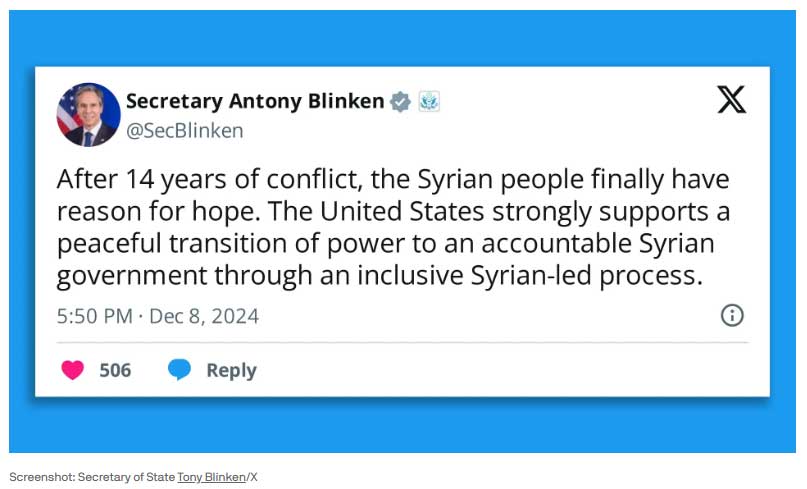U.S. Ramps Up Efforts to Eliminate Syria’s Chemical Weapons Threat
The United States is intensifying its collaboration with Middle Eastern allies to ensure Syria’s remaining chemical weapons do not fall into the wrong hands, according to a senior U.S. official. These efforts come amid growing instability in Syria and concerns about dangerous weapons being exploited by terrorist groups.
Why This Matters
The collapse of Syrian security forces has created a volatile situation, raising fears that chemical weapons stockpiled by the Assad regime could be seized by extremist factions. President Joe Biden underscored the urgency of the issue, pledging support to Syria’s neighbors—Lebanon, Iraq, Jordan, and Israel—to counter potential threats originating from Syria.
Secretary of State Tony Blinken reiterated this stance, emphasizing the need for accountability for atrocities committed by the Assad regime, including the use of chemical weapons.
A Troubled History of Chemical Weapons in Syria
The Assad regime’s use of chemical weapons against civilians in 2013 shocked the world, violating a “red line” previously set by then-President Obama. While military intervention was averted through a U.S.-Russia deal to dismantle Syria’s chemical arsenal, intelligence reports indicated that Assad’s regime retained portions of its stockpile, undermining the agreement.

Ongoing Military Actions
Recent developments have seen the Israeli Air Force conducting strikes on Syrian military installations associated with chemical weapons and ballistic missiles. Israeli officials stated that these operations aim to prevent strategic weapons from falling into hostile hands. Meanwhile, U.S. Central Command (CENTCOM) launched precision airstrikes targeting ISIS camps in central Syria, aiming to degrade the terrorist group’s ability to reconstitute amidst the chaos.
Efforts to Secure Syria’s Chemical Arsenal
The Biden administration has focused on safeguarding Syria’s chemical weapons, with intelligence suggesting the inventory remains under control for now. A U.S. official highlighted measures being taken to ensure the destruction or secure handling of dangerous materials, such as chlorine and other chemical agents, in collaboration with regional partners.
Rebel Groups’ Position
Syrian rebels advancing toward Damascus have pledged to handle Assad’s military bases and chemical stockpiles responsibly. In a statement, the rebels assured the international community of their commitment to securing sensitive sites and adhering to international law concerning banned weapons.
Biden’s Vision for Syria’s Future
In a recent speech, President Biden outlined U.S. policy for Syria during the final weeks of his administration. He expressed support for a transition to an independent and sovereign Syria, emphasizing that the country’s future should be determined by its people. Biden also urged Middle Eastern leaders and Syrian opposition groups to work toward a united and inclusive government.
Biden acknowledged concerns about the past actions of some rebel groups, cautioning that their future conduct will be closely scrutinized. “Words are important, but actions will define their legitimacy,” he remarked.
A Message to Regional and Global Stakeholders
The president highlighted the need for any new Syrian government to uphold the rule of law and protect minority rights. He called the end of Assad’s regime a crucial step toward justice but warned against replacing one form of tyranny with another.
What’s Next?
The U.S. will continue diplomatic outreach to all Syrian factions, including those once deemed adversarial. Biden has committed to engaging with regional partners and opposition groups to ensure Syria transitions toward stability and governance that serves all its people.
This article was rewritten by JournosNews.com based on verified reporting from trusted sources. The content has been independently reviewed, fact-checked, and edited for accuracy, neutrality, tone, and global readability in accordance with Google News and AdSense standards.
All opinions, quotes, or statements from contributors, experts, or sourced organizations do not necessarily reflect the views of JournosNews.com. JournosNews.com maintains full editorial independence from any external funders, sponsors, or organizations.
Stay informed with JournosNews.com — your trusted source for verified global reporting and in-depth analysis. Follow us on Google News, BlueSky, and X for real-time updates.














